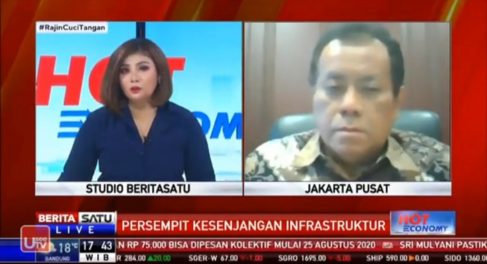Ari Kuncoro on Hot Economy, Berita Satu TV: Government Strategy in Narrowing the Infrastructure Gap
Nino Eka Putra ~ PR of FEB UI
DEPOK – (24/8/2020) The gap in infrastructure in this country is still quite wide. The World Bank stated that the government needed funds of up to USD 1.6 trillion or around IDR 23,200 trillion to close the domestic infrastructure gap. Finance Minister Sri Mulyani said the development gap between Java and outside Java is still a homework for the government.
In the long-term , the balance of infrastructure in Indonesia is uneven. In Java, it is impossible to develop urban areas entirely, there needs to be a balance of land such as water management, green areas, agriculture, and so on. Related to history, Java has experienced agglomeration since the Dutch colonial era, which became a strong attraction or economic nexus.

“Infrastructure follows the law of agglomeration, meaning that it cannot just spread. We need to take into account the conditions for supporting infrastructure growth. Outside Java, such as South and North Sulawesi, infrastructure development needs to be streamlined in order to support the push, without having to make the process repeat itself as in Java. So, consolidate the activities of a region, so that infrastructure becomes efficient and strengthens attractiveness that can connect the poles of economic growth in various regions. ” stated Professor Ari Kuncoro, Rector of Universitas Indonesia who was a guest speaker in the Hot Economy event on Berita Satu TV “Narrowing the Infrastructure Gap “, Guided by Poppy Zeidra, on Monday (24/8/2020).
The government has an alternative to
collaborating with the private sector in encouraging infrastructure development. In this case, the government can regulate a limited APBN for several regions, with the rest coming from private funds, so that the total amount of infrastructure that can be built becomes more evenly distributed and increases. On the one hand, the government must take into account that the private sector should benefit from this cooperation. Such as the construction of a sky highway as a physical infrastructure that allows MSMEs to enter the marketplace to save on promotional costs and information,” said Ari.
“The strategy that the government can take towards sustainability and overcoming the infrastructure gap in Indonesia is not to shove everything on one push that relies on the APBN alone, but by means of a jump start that can generate budgets outside the APBN. That is why, a kind of astuteness is needed in how to put infrastructure investment by balancing growth, quality of life and the environment, and income distribution. So, there is a need for a combination of incentives (investment for the private sector), a well-functioning market (economic actors), and government spending,” Ari stated in closing his session. (hjtp)





(am)

